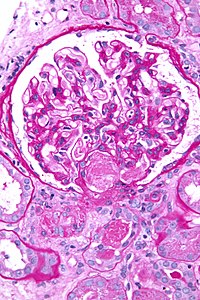
Photo from wikipedia
BackgroundCoagulopathy in traumatic brain injury (TBI) has been associated with poor neurological outcomes and higher in-hospital mortality. In general principle of trauma management, hypothermia should be prevented as it directly… Click to show full abstract
BackgroundCoagulopathy in traumatic brain injury (TBI) has been associated with poor neurological outcomes and higher in-hospital mortality. In general principle of trauma management, hypothermia should be prevented as it directly worsens coagulopathy. Therefore, we examined the safety of mild therapeutic hypothermia (MTH) in patients with coagulopathy following severe TBI.MethodsWe re-evaluated the brain hypothermia (B-HYPO) study data based on coagulopathy and compared the Glasgow Outcome Scale scores and survival rates at 6 months using per protocol analyses. Coagulopathy was defined as an activated partial thromboplastin time (APTT) > 60 s and/or fibrin/fibrinogen degradation product levels (FDP) > 90 μg/mL on admission. Baseline characteristics, coagulation parameters, and outcomes were compared between the control and MTH groups with or without coagulopathy.ResultsIn patients with coagulopathy, 12 patients were allocated to the control group (35.5–37.0 °C) and 20 patients to the MTH group (32–34 °C). In patients without coagulopathy, 28 were allocated to the control group and 59 patients were allocated to the MTH group.In patients with coagulopathy, favorable neurological outcomes and survival rates were comparable between the control and MTH groups (33.3% vs. 35.0%, P = 1.00; 50.0% vs. 60.0%, P = 0.72) with no difference in complication rates. On admission, no significant differences in APTT or FDP levels were observed between the two groups; however, APTT was significantly prolonged in the MTH group compared to the control group on day 3.DiscussionBased on our study, MTH did not seem to negatively affect the outcomes in patients with coagulopathy following severe TBI on admission; therefore, the present study indicates that MTH may be applicable even in patients with severe TBI and coagulopathy.ConclusionsOur study suggests that in comparison to control, MTH does not worsen the outcome of patients with coagulopathy following severe TBI.Trial registrationUMIN-CTR, No. C000000231, Registered 13 September 2005.
Journal Title: Scandinavian Journal of Trauma, Resuscitation and Emergency Medicine
Year Published: 2017
Link to full text (if available)
Share on Social Media: Sign Up to like & get
recommendations!